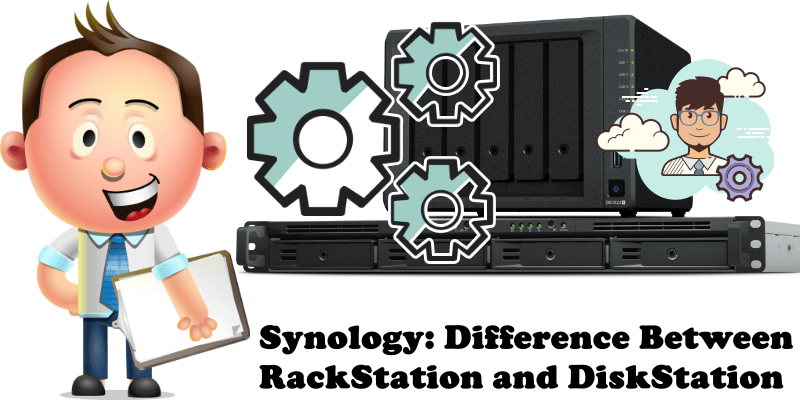
After my review of the RS422+ some of you have written to me asking what is the difference between the Synology NAS RackStation series and the Synology NAS DiskStation series.
This article today opens the conversation with a small overview of these two types of products which share the same DSM operating system, but have different a appearance and software configurations, not to mention address different types of user needs.
Materials Quality. RackStation series NAS devices are built in a professional way. What do I mean by professional way? There is a great focus on choosing very high quality materials, starting from the metal used to the plastic, and the product itself oozes robustness. The DiskStation Series products are made from visibly cheaper materials compared to the RackStation.
Business vs Home use. RackStation series NAS devices are primarily used in an enterprise environment. DiskStation NAS devices are commonly used in a home environment. Some people of course run RackStation devices at home. When going for RackStation vs DiskStation for home use, the idea is to get a better device, as in a more robust, higher performance device. However, RackStation is not always better than DiskStation, an aspect discussed under the fifth difference listed below.
Rack Mount vs Desktop. RackStation series NAS devices are inserted into a Rack. Rack mounting is the operation of mounting hardware devices that lend themselves to it in a special rack. Rack mounting is commonly used in large companies to hold network servers, routers, switches and other network devices. DiskStation series NAS devices both fit and sit perfectly on your desk without the need to have a rack to mount them in. One of the things I like about rack mounting is the fact that you can put multiple devices in the same rack and are able to do workmanlike wiring since access to the connecting cables is easy. Going for Rack Station vs DiskStation comes with benefits such as a much cleaner installation process and better space organization for improved efficiency.
Noise. RackStation series NAS devices are generally much noisier than DiskStation series NAS devices. This is because they usually have more fans – quite a few more. While the noise coming from the fans may be greater, the main advantage is that ventilation is also greater which is what allows the RackStation device to stay “cooler” given the typically higher workload. I don’t recommend keeping a RackStation NAS in your bedroom, for example, simply because you won’t be able to sleep well due to the noise. But the DiskStation series NAS devices are surprisingly quiet for a server. To give you an idea, in my bedroom I have one DS1621xs+ and one DVA3221 only a few meters away from my bed, and they are on 24/7. And yet I sleep well because I can’t even hear the fans running, that’s how quiet they are.
Hardware. The RackStation series NAS is not always better performing than the DiskStation series. The difference is quite noticeable between the RackStation model RS422+ and the DiskStation model DS1522+. As you can see for yourself in the comparison, while the two devices share the same powerful AMD Ryzen R1600 processor, the DS1522+ supports a memory upgrade vs the RS422+ which doesn’t. Not just this, but the DS1522+ also supports the use of the M.2 2280 NVMe SSDs, while the RS422+ RackStation model does not. In this case, given the two products retail for the same price, approximately $690 or 677 EUR, you should definitely go for the DS1522+ even though the RS422+ is built more robustly. On the other hand however, there are many more RackStation models that are much more powerful than most DiskStation models, with much more powerful CPUs, many more bays, the option to add more RAM and, very important, redundant PSU (a Redundant Power Supply contains two or more power supply units inside it). You can find these models in the first dark gray link at the beginning of this article.
10GbE Network. A few years ago this was quite the big difference between RackStation and DiskStation Series NAS devices, with only the first type providing support for the 10GbE Network feature. However, this is no longer the case as nowadays many of the DiskStation NAS devices have support for the 10GbE Network upgrade as well.
Note: I hope this article has opened your mind to the main differences between Synology’s RackStation vs DiskStation series NAS devices. When looking for the NAS of your dreams, always follow your friend Marius’ advice to choose the one best suited for your needs!
This post was updated on Friday / August 26th, 2022 at 7:17 PM
